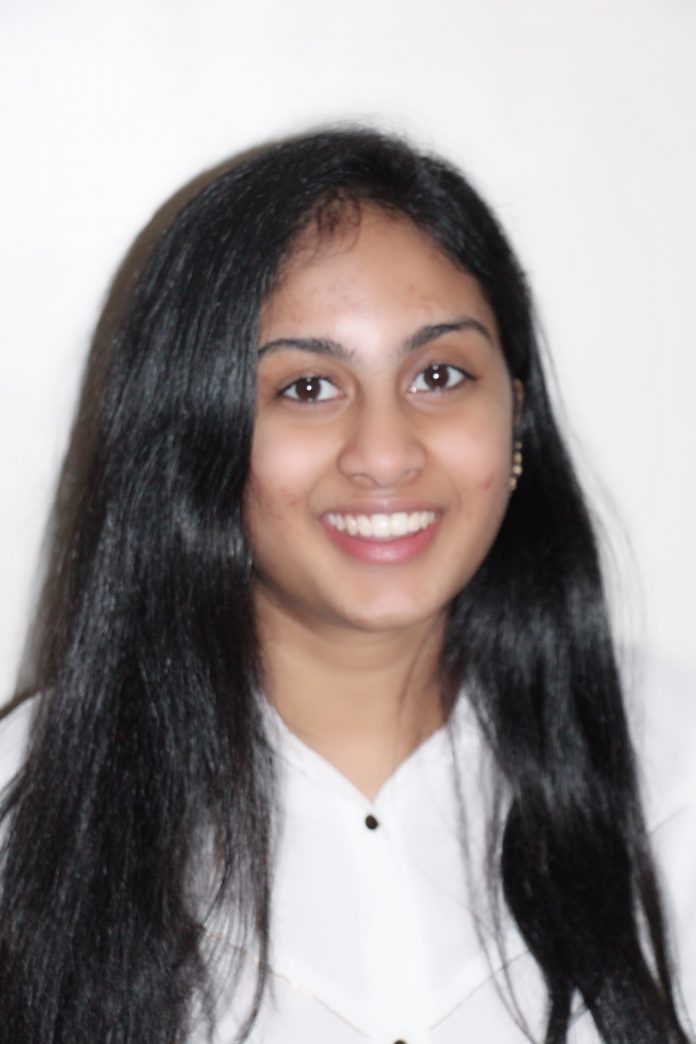
Entrepreneur Sree Dasari found a need in the marketplace: a way to practice public speaking, a common source of discomfort for many. Dasari, who lives in Cumberland and is a senior at La Salle Academy in Providence, is the founder of Vadati VR, which uses virtual reality to simulate a real-live audience environment.
PBN: What are some of the resources you have used in the process of creating your business plan, getting a patent, mentors, preparing a pitch for investors, etc.?
DASARI: La Salle Academy really encouraged me in conducting my research and taking it to the 2018 Rhode Island Science and Engineering Fair. I also sent out various emails to professors and persons involved in the field I was researching for help in analyzing data.
My mentor for my research was a graduate student at Virginia Tech who was specializing in [virtual reality/augmented reality]. He really helped me in the whole process of writing a research paper, which just got accepted into the Journal of Emerging Investigators. The science fair provided a means to validate my idea and research.
After the fair, my project was first mentioned in the Providence Journal. Rhode Island Virtual Reality had approached me and led me to a lot of great opportunities to grow my connections. They really helped me with my next steps in drafting my business proposal.
The Rhode Island Lt. Governor’s Entrepreneurship Challenge opened many doors and resources. I had practiced executing my pitch at General Electric’s headquarters in Boston through the Girls Who Code summer immersion program before the challenge and they were all really motivating.
My next phase is to raise money to commercialize the product.
PBN: Where, when and how did you conduct trials for the VR innovation?
DASARI: I … tested whether a virtual environment can simulate the same anxiety as an actual classroom environment at La Salle Academy from December 2017 to March 2018. I received a lot of encouragement from Mr. Stephen Lakeland and Mr. Seth Hajian.
First, I had to seek out multiple students in my school who were willing to be in the study. … I had them first fill out a consent form.
Before experimentation, I had to record the environment that I wanted to be displayed as the virtual environment that the user would have to present to. I did this by recording a chemistry classroom filled with students using a Samsung video recorder.
The experiment consisted of a student, Samsung gear VR headset, two smartphones – one played the virtual environment in the headset and the other was used for tracking heart rate – and an AliveCor heart-rate sensor.
During testing, I had the student put on the VR headset and had them respond to a simple prompt [such as] “What is your favorite animal and why?” for a minute while their heart rate was recorded. I had them do the same task without the VR headset. I varied the order amongst the participants to make sure the results were unbiased. I saw that there was significantly increased heart rate when a participant presented to a virtual environment compared to when they presented to just me, without the VR headset.
PBN: Vadati VR provides feedback on public speaking to the user. How so?
DASARI: Vadati VR uses heart rate as the primary measure of anxiety during public speaking. As EKG is also captured, it provides a constant feedback how the heart rate is progressing in the experience. There is rapid advancement of wearable devices, which measure heart rate. Vadati VR plans to use this advancement to actually gather and … process the information to give continuous feedback to the user as they speak to a virtual audience. There will be a rapid progress in biosensors in the future and this data would provide additional ways to provide feedback to the user going forward.
PBN: Would it be accurate to say that the product doesn’t take away anxiety regarding public speaking but helps speakers learn how to better cope with it?
DASARI: The validation study was conducted to confirm that the VR experience does show a means to simulate the real experience. I am happy to share that my research paper was accepted into the Journal of Emerging Investigators. The research work was validated by two Ph.D. students from Harvard University and one from Emory University. The product is based on the … research work and the provisional utility patent has been filed on the methodology.
Vadati VR will build a platform [that] hosts the ecosystem of experiences where a student can practice public speaking in a VR experience multiple times and measure their heart rate.
The product would, in a way, take away anxiety. … As you practice more and more, that anxiety is not as present over time.
PBN: You mentioned that you have been in situations where you were nervous about public speaking, helping to lead to this idea. But you have to do more public speaking to present this product. How is that going?
DASARI: I was incredibly nervous when I first started public speaking in class [as a freshman]. I noticed that as I did more public speaking in a class environment, I was not as nervous anymore because I had gotten used to that environment. This is the same case now. I was nervous presenting my product to professionals, but after doing more and more presentations, I am not as nervous and actually enjoy presenting the product I am so passionate about.
In addition, I have been approached by multiple First Lego League teams to demo the product to young children that are aspiring to be innovators. It’s a very thrilling experience to talk about my product and journey, but I really want my product to give myself and others the opportunity to enjoy public speaking right off the bat by being able to practice with a virtual environment beforehand.
Susan Shalhoub is a PBN contributing writer.











